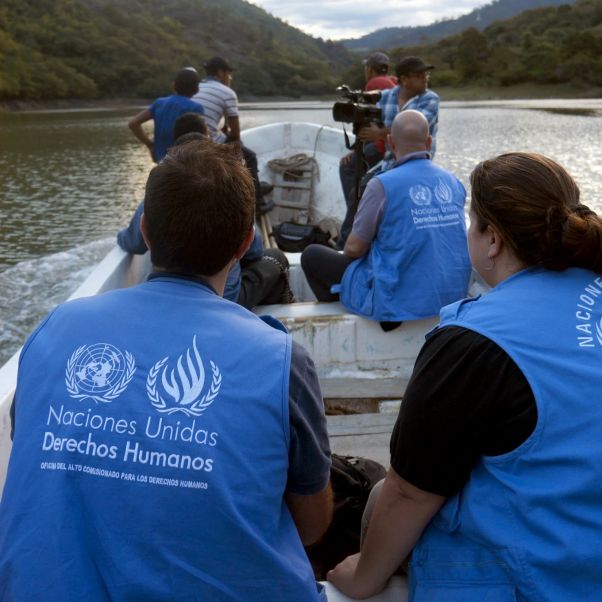About UN Human Rights

About Us
-
About UN Human Rights
- Mandate
- Mission
-
The High Commissioner
- Volker Türk, High Commissioner
- Nada Al-Nashif, Deputy High Commissioner
- Ilze Brands Kehris, Assistant Secretary-General
-
Past High Commissioners
- Michelle Bachelet Jeria, Chile, 2018-2022
- Mr. Zeid Ra'ad Al Hussein, Jordan, 2014-2018
- Ms. Navanethem Pillay, South Africa, 2008-2014
- Ms. Louise Arbour, Canada, 2004-2008
- Bertrand Ramcharan (Acting High Commissioner)
- Mr. Sergio Vieira de Mello, Brazil, 2002-2003
- Mrs. Mary Robinson, Ireland, 1997-2002
- Mr. José Ayala-Lasso, Ecuador, 1994-1997
- Past Deputy High Commissioners
- Past Assistant Secretaries-General
- What we do
- Where we work
-
Funding and budget
- Our donors
- Funding trends
-
Trust funds
- Special Fund of the OPCAT
- UN Voluntary Fund for Indigenous Peoples
- UN Voluntary Fund for Technical Cooperation
- UN Voluntary Fund on Contemporary Slavery
-
UN Voluntary Fund for Victims of Torture
- Mandate
- About the Fund’s assistance for victims
- Board of Trustees
- How the Fund is managed
- Reports
- Activities
- 40th anniversary
- International Day in Support of Victims of Torture
- Videos
- Feature stories
- How to apply for an annual grant
- Annual grant cycle
- How to report on a grant
- Emergency grants
- How to contribute to the Fund
- Group of Friends
- Evaluation
- Memorial
About Us
-
About UN Human Rights
- Mandate
- Mission
-
The High Commissioner
- Volker Türk, High Commissioner
- Nada Al-Nashif, Deputy High Commissioner
- Ilze Brands Kehris, Assistant Secretary-General
-
Past High Commissioners
- Michelle Bachelet Jeria, Chile, 2018-2022
- Mr. Zeid Ra'ad Al Hussein, Jordan, 2014-2018
- Ms. Navanethem Pillay, South Africa, 2008-2014
- Ms. Louise Arbour, Canada, 2004-2008
- Bertrand Ramcharan (Acting High Commissioner)
- Mr. Sergio Vieira de Mello, Brazil, 2002-2003
- Mrs. Mary Robinson, Ireland, 1997-2002
- Mr. José Ayala-Lasso, Ecuador, 1994-1997
- Past Deputy High Commissioners
- Past Assistant Secretaries-General
- What we do
- Where we work
-
Funding and budget
- Our donors
- Funding trends
-
Trust funds
- Special Fund of the OPCAT
- UN Voluntary Fund for Indigenous Peoples
- UN Voluntary Fund for Technical Cooperation
- UN Voluntary Fund on Contemporary Slavery
-
UN Voluntary Fund for Victims of Torture
- Mandate
- About the Fund’s assistance for victims
- Board of Trustees
- How the Fund is managed
- Reports
- Activities
- 40th anniversary
- International Day in Support of Victims of Torture
- Videos
- Feature stories
- How to apply for an annual grant
- Annual grant cycle
- How to report on a grant
- Emergency grants
- How to contribute to the Fund
- Group of Friends
- Evaluation
- Memorial
The Office of the High Commissioner for Human Rights (UN Human Rights) is the leading UN entity on human rights. We represent the world's commitment to the promotion and protection of the full range of human rights and freedoms set out in the Universal Declaration of Human Rights.
Both the High Commissioner and the Office have a unique role to:
- Promote and protect all human rights: We speak out objectively in the face of human rights violations and help elaborate the standards that are used to evaluate human rights progress worldwide.
- Help empower people: Our research, education, and advocacy activities, contributes to the increased awareness and engagement by the international community and the public on human rights issues. This means thousands of people in all regions of the world are empowered to claim their rights.
- Assist Governments: Through our field presences, we help prevent abuses and contribute to defusing situations that could lead to conflict. Our monitoring and analysis feeds sensitive decision-making and development programming. We also provide capacity-building and legal advice to thousands, supporting the development and judicious enactment of laws and policies the world around.
- Inject a human rights perspective into all UN programmes: We mainstream human rights into all UN programmes to ensure that peace and security, development, and human rights - the three pillars of the UN - are interlinked and mutually reinforced.
History of the mandate
The UN General Assembly established The Office of the High Commissioner for Human Rights in December 1993 through its resolution 48/141 which also details its mandate. This was just a few months after the World Conference on Human Rights adopted the Vienna Declaration and Plan of Action.
Adopted by 171 States, the Vienna Declaration renewed the world's commitment to human rights. It also called for strengthening and harmonizing the monitoring capacity of the United Nations system with regards to human rights.
Read more about the history of UN Human Rights
Our mission
In carrying out our mission UN Human Rights:
- Gives priority to addressing the most pressing human rights violations, both acute and chronic, particularly those that put life in imminent peril
- Focuses attention on those who are at risk and vulnerable on multiple fronts
- Pays equal attention to the realization of civil, cultural, economic, political, and social rights, including the right to development
- Measures the impact of its work through the substantive benefit that is accrued, through it, to individuals around the world
Our strategic vision for human rights work
To fulfil its mission, UN Human Rights follows a robust framework of results known as the OHCHR Management Plan (OMP). This roadmap is based on the outcomes of consultations with Member States, the UN system, civil society, the donor community and the private sector. The current OMP is strongly anchored to the 2030 Development Agenda and covers the period from 2018-2021 inclusive.